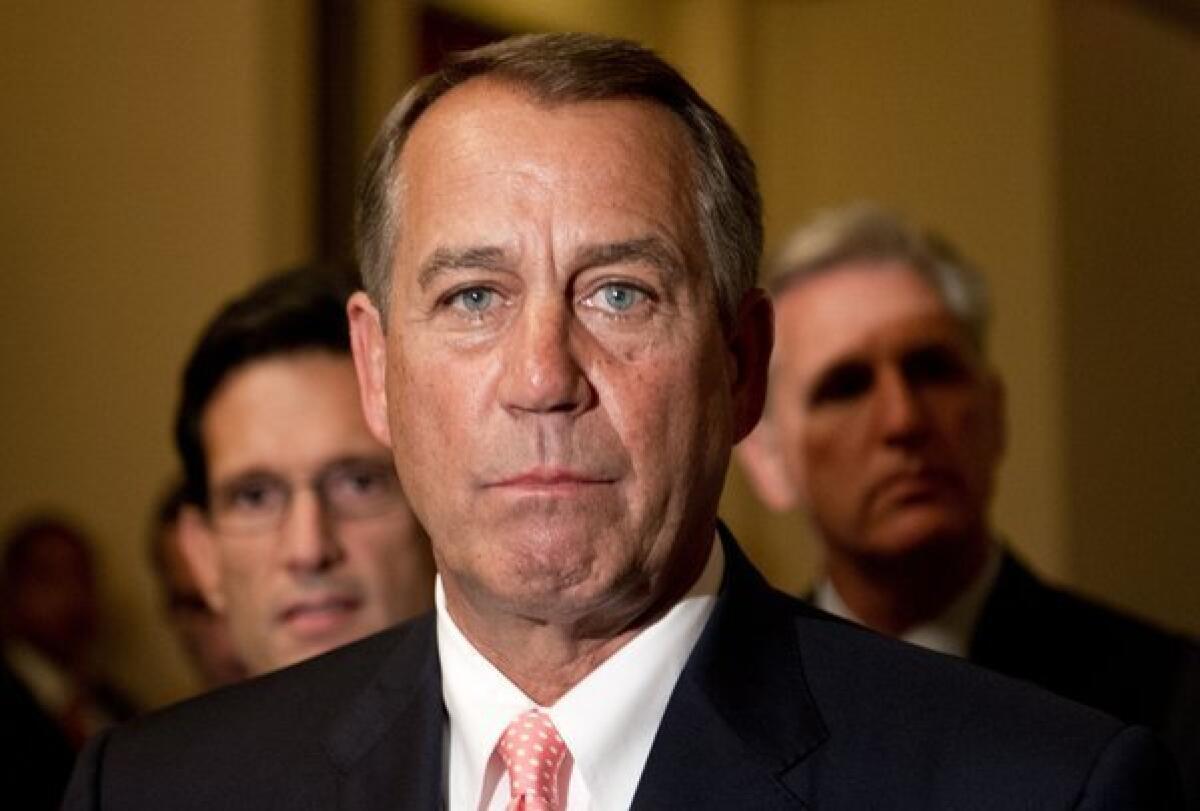Government shutdown: A way out for the GOP

Last week, House Speaker John A. Boehner (R-Ohio) and his Republicans declared that they had two clear goals in this fall’s battle over federal spending: no government shutdown, and no implementation of Obamacare.
As of Tuesday, the GOP had failed on both counts. The federal government was closed, and Obamacare was sputtering into action — at least in jurisdictions where its websites didn’t crash.
Worst of all from the GOP’s standpoint, most voters appeared to blame Boehner and other conservatives for the logjam. The flood of public support promised by tea party Republicans didn’t arrive. Even before the shutdown, public approval of Congress had slumped to a new low of 10% in a CNN poll, and only 1 in 3 voters had a favorable view of Boehner — making him not only less popular than Obama, but also less popular than Obamacare.
FULL COVERAGE: The government shutdown
I wrote this column Tuesday; it’s possible that by the time you’re reading it, the impasse has been solved — but I doubt it. If not, this might be a good time for House Republicans to look for a dignified exit from the corner they’ve painted themselves into. Indeed, that’s what an increasing number of relatively moderate conservatives in the GOP caucus have started saying.
On Tuesday, Rep. Scott Rigell (R-Va.) broke with the leadership, saying he still wanted to repeal Obamacare but that it was time to reopen the government and move on. Before that, it was Rep. Devin Nunes (R-Tulare), who said his colleagues were behaving like “lemmings with suicide vests.”
But it’s not up to backbenchers like Rigell and Nunes, legislators you’ve probably never heard of, to find the way out of a partisan logjam that is costing taxpayers money without achieving any purpose.
That’s what congressional leaders are supposed to do — and what they haven’t shown any ability to accomplish in this latest and most ridiculous fiscal standoff.
Instead, Boehner has deferred to the demands of hard-liners in his own conference and insisted on linking federal spending to defunding or delaying Obamacare — a nonstarter in the Democratic-run Senate. He hasn’t been able to negotiate another approach because his slim House majority of 16 seats includes about 30 hard-liners who have threatened to bolt if he deviates from their wish list.
Senate Minority Leader Mitch McConnell (R-Ky.) hasn’t been able to negotiate freely, either, but for a more personal reason: He’s facing a challenge in the GOP primary election next year from a tea party Republican who accuses him of being too moderate.
And Senate Majority Leader Harry Reid has little incentive to negotiate, since the Democrats are winning merely by saying no.
As the shutdown continues, however, and the frightening prospect of a mid-October crisis over the federal debt ceiling nears, all sides will want to make a deal.
Boehner’s proposal that the House and Senate meet in a conference to iron out their differences might provide the pathway to an agreement. A conference could wrap together the spending issue, an agreement to raise the debt ceiling and modest changes to Obamacare (such as repealing the tax on medical devices that neither party likes). That would give each side something it wants.
Another path would be for Obama to try something that worked last year when Congress was facing a “fiscal cliff”: Send Vice President Joe Biden, a canny negotiator who’s trusted by both sides, up to Capitol Hill until a bargain is struck. Either way, Boehner will feel increasing pressure to abandon the demands of his tea party faction. Some congressional aides estimate that almost 200 of the 232 House Republicans could support a spending deal that doesn’t stop Obamacare — except for the embarrassing fact that if the tea party members bolt, Boehner would need to ask Rep. Nancy Pelosi (D-San Francisco) and other Democrats for help in amassing a majority.
Would such a move cost Boehner his job as speaker? Maybe — but maybe not. Some Democrats have said, a tad mischievously, that they’d be willing to rescue Boehner if he’d pass a “clean” spending bill and allow a vote on the immigration reform bill that the Senate has already passed. “I’d vote for him to remain speaker until the next election if he’d allow these issues to come to the floor,” Rep. Henry A. Waxman (D-Beverly Hills) told me Monday.
At the moment, that’s mostly a fanciful idea. It would make the House of Representatives look more like the Italian Parliament, run by a multiparty coalition constantly on the brink of collapse. But then, come to think of it, that’s not far from what we have now. The longer the standoff continues, the better that kind of gamble may look — even to a cautious man like John Boehner.
Twitter: @DoyleMcManus
More to Read
A cure for the common opinion
Get thought-provoking perspectives with our weekly newsletter.
You may occasionally receive promotional content from the Los Angeles Times.











